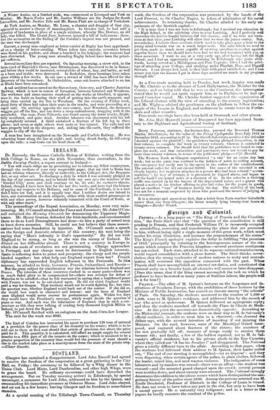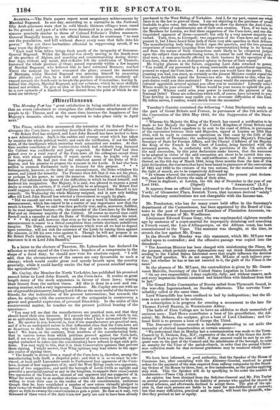_foreign anti erolonial.
PRIIISSIA.—In a long paper on "The King of Prussia and the Constitu- tion," the Paris Siècle says that "the question of the constitution is still pending in Prussia, and that Frederick William IV. is incessantly occupied in remodelling, correcting, and transforming the plans that are presented to him, without losing sight a single moment of this great work, which must render his reign illustrious, and increase the preponderance of his states." The King's French apologist explains the delay in fulfilling "the promises of 1813," principally by referring to the heterogeneous nature of the ele- ments which compose the Prussian kingdom—several provinces contiguotts but not united. Each state, attached to its separate national reminiscences, would regard consolidation with a pious horror. The Siècle thinks, never- theless, that the strong tendencies of modern nations to unity and central- ization will overcome this opposition connected with the past. Whew Prussia shall have accomplished an internal revolution, and constituted the national unity on a broader basis, all obstacles will sooner or later disappean. [Does this mean, that if the King cannot accomplish the task on which he professes to have bestowed so many years of fruitless labour, the people will do it for him?) FRANCE.—The affair of M. Quinet's lectures on the languages and in- stitutions of Southern Europe, with the prohibition of those lectures by the Minister of Public Instruction, has caused an emeute among "the schools* of Paris. On Saturday, the students mustered to the number of 1,200 or 1,500, went to M. Quinet's residence, and addressed him by the mouth Of one who acted as spokesman. M. Quinet delivered an appropriate reply; and then the students marched off towards the Place de l'Ecole de Medi. ems. At this point the accounts are diametrically opposite. According be the Ministerial journals, the students were on their way to M. de Salvandfs official residence, in order to treat him to a charkare,—the Journal dee Debate says, with the avowed intention of insulting if not injuring the Minister. On the road, however, some of the Municipal Guard Inter- posed, and captured about fourteen of the rioters; the numbers or the rest gradually fell off; rumours of troops ready to receive them became rife; and finally, a few of the boldest repaired, not to M. de Sal- vandy's official residence, but to his private abode in the Rue Cassette; where they called out "A bas lea Jesuites l" and disappeared. The National gives a totally different turn to the affair. According to that paper, when the students had delivered their address to M. Quinet, their leader called out, "The end of our meeting is accomplished—let us disperse": arid they were dispersing, when certain agents of the police, in plain clothes, followed the leader, seized him, and used wanton violence. The indignation of some labourers and bystanders was roused—there was an affray—the student was rescued—and the mounted guard charged upon the crowd: several person/ were trodden down, and about twenty were arrested. The I rational strongly denounces this addition to the odious scenes which have distinguished the san- guinary history of the police since 1830. Among the persons arrested was M. Emile Desohatel, Professor of Rhetoric in the College of Louis le Grand. He does not seem to have taken any part in the riot, but only to have been a casual passer. He is naturally very indignant; and in a letter to the papers he loudly censures the conduct of the police. ALonata.—The Paris papers report most sanguinary achievements by Marshal Bugeaud. In one day, according to a narrative in the National, fifty Arab prisoners were shot in cold blood; thirteen villages were razed to the ground; and part of a tribe were destroyed in a cave, under circum- stances precisely similar to those of Colonel Pelissier's Dahra massacre. General Bourjolly boasts, in an official letter, that he continues "to root out the population, and kill without itercy every man that falls into his power." Nor are these barbarities effectual in suppressing revolt, if we may trust the Reforme7-
" Each mad from Africa brings fresh proofs of the incapacity of Governor- General Bugeaud. Whilst the Marshal was slowly moving in the South-west of the province of Algiers, and marching and countermarching during thirty- four days, without any result, Abd-el-Kader left the subdivision of Tlemcen; traversed the whole province of Oran; passed repeatedly within a few leagues of Marshal Bugeaud, who believed him to have reentered Morocco; reached Tiaret the moment the latter evacuated the place; crossed the mountains of Matrnata, whilst Marshal Bugeaud was amusing himself by measuring their altitude; and then, by a bold and decisive manoeuvre, resolutely ad- vanced towards the South-east to invade the province of Constantine; leaving fa behind him Algiers, Marshal Bugeaud, and our columns, which he most skilfully turned and avoided. To give an idea of his boldness, we need only observe that be is now upwards of a hundred leagues distant from the point at which he en- tered our territory."



























 Previous page
Previous page